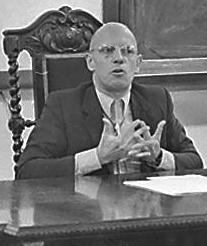Michel Foucault frasi celebri
da Michel Foucault, un'intervista: il sesso, il potere e la politica dell'identità, in Archivio Foucault. Interventi, colloqui, interviste, a cura di Alessandro Pandolfi, traduzione di Sabina Loriga, Feltrinelli, Milano, 1996, vol. III
da Malattia mentale e psicologia, traduzione di F. Polidori, Cortina Raffaello, 1997
Frasi sulla pazzia di Michel Foucault
“Dall'uomo al vero uomo, la strada passa per l'uomo pazzo.”
da Storia della follia nell'età classica
Variante: Dall'uomo all'uomo vero, il cammino passa attraverso l'uomo folle.
“Non esiste una sola cultura al mondo in cui sia permesso di fare tutto.”
appendice La follia, l'assenza di opera, p. 478
Storia della follia nell'età classica
Origine: Storia della follia nell'età classica, p. 607
Michel Foucault Frasi e Citazioni
pag. 58
Storia della follia nell'età classica
da Due risposte sull'epistemologia, traduzione di A. Fontana, Lampugni Nigri, Milano, 1971
“La libertà di coscienza comporta più rischi dell'autorità e del dispotismo.”
2012
Storia della follia nell'età classica
da Perché studiare il potere: la questione del soggetto, traduzione di Roberto Cagliero, revisione di Marcella Pogatschnig, in Poteri e strategie, a cura di P. Dalla Vigna, Mimesis Edizioni, 1994
da Potere-corpo, in Microfisica del potere: interventi politici, a cura di Alessandro Fontana, Pasquale Pasquino, traduzione di Giovanna Procacci, Einaudi, 1982<sup>4</sup>
da La volontà di sapere, traduzione di Pasquale Pasquino e Giovanna Procacci, Feltrinelli, 1978, pp. 116-7
da Sorvegliare e punire; citato in la Repubblica, 8 febbraio 2008
da «Io sono un artificiere», giugno 1975, in Conversazioni. Interviste di Roger-Pol Droit, a cura di Fabio Polidori, Mimesis Edizioni, 2007
pag. 53
Storia della follia nell'età classica
pag. 84
Storia della follia nell'età classica
da Tecnologie del sé. Un seminario con Michel Foucault, a cura di Luther H. Martin, Huck Gutman, Patrick H. Hutton, traduzione di Saverio Marchignoli, Boringhieri, Torino, 1992, p. 23
The Lives of Michel Foucault: a Biography, di David Macey, Vintage Editions 1995
Michel Foucault: Frasi in inglese
“What desire can be contrary to nature since it was given to man by nature itself?”
Origine: Madness and Civilization: A History of Insanity in the Age of Reason
Origine: The Birth of the Clinic: An Archaeology of Medical Perception
As quoted in Michel Foucault (1991) by Didier Eribon, as translated by Betsy Wind, Harvard University Press, p. 282
Contesto: There are more ideas on earth than intellectuals imagine. And these ideas are more active, stronger, more resistant, more passionate than "politicians" think. We have to be there at the birth of ideas, the bursting outward of their force: not in books expressing them, but in events manifesting this force, in struggles carried on around ideas, for or against them. Ideas do not rule the world. But it is because the world has ideas (and because it constantly produces them) that it is not passively ruled by those who are its leaders or those who would like to teach it, once and for all, what it must think.
“there is no glory in punishing”
Origine: Discipline and Punish: The Birth of the Prison
Origine: The History of Sexuality, Volume 1: An Introduction
“The language of psychiatry is a monologue of reason about madness”
Preface to 1961 edition
History of Madness (1961)
Contesto: The constitution of madness as mental illness, at the end of the eighteenth century, bears witness to a rupture in a dialogue, gives the separation as already enacted, and expels from the memory all those imperfect words, of no fixed syntax, spoken falteringly, in which the exchange between madness and reason was carried out. The language of psychiatry, which is a monologue by reason about madness, could only have come into existence in such a silence.
Origine: The History of Sexuality, Volume 2: The Use of Pleasure
Preface to 1961 edition
History of Madness (1961)
Las Meninas
The Order of Things: An Archaeology of the Human Sciences (1970)
Part Two: 2. The Transcendence of Delirium
History of Madness (1961)
Vol I: La volonté de savoir
An Introduction. NY: Pantheon. Translated from French by Robert Hurley. Page 43
History of Sexuality (1976–1984)
Part Four, Complete and austere institutions
Discipline and Punish (1977)
In reference to Sadism and Masochism, as quoted in Who's Who in Contemporary Gay & Lesbian History: From World War II to the Present Day (2001) by Robert Aldrich and Gary Wotherspoon
Vol. I, p. 101
History of Sexuality (1976–1984)
"What is an author?" (1984)
Part Two: 2. The Transcendence of Delirium
History of Madness (1961)
Lecture 2, January 17, 1979, pp. 45-46
The Birth of Biopolitics (1978)
Origine: Lectures on the Will to Know (1970), pp. 4-5
Lecture 2, January 17, 1979, p. 36
The Birth of Biopolitics (1978)
Part One: 5. The Insane
History of Madness (1961)
Part Three, The Means of Correct Training
Discipline and Punish (1977)
Origine: Discipline and Punish (1977), pp. 13, Chapter One The Body of the Condemned
